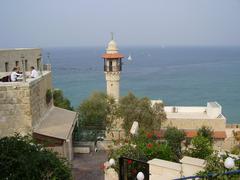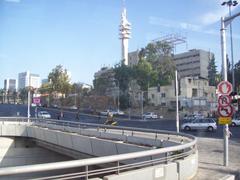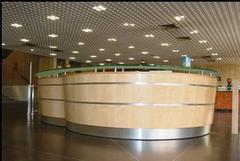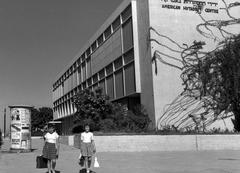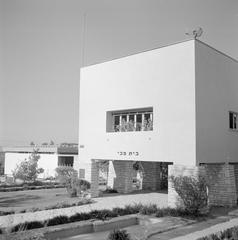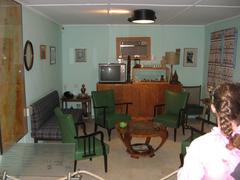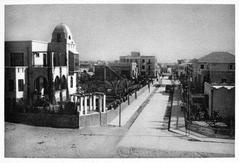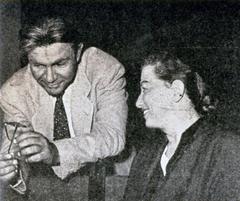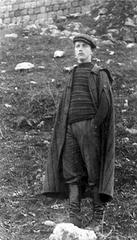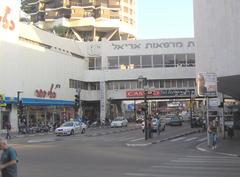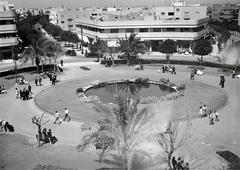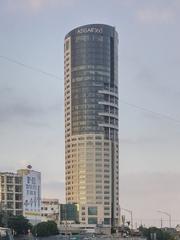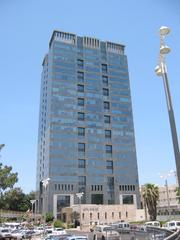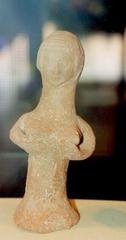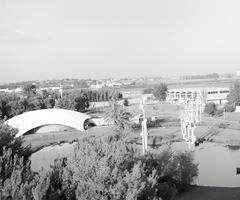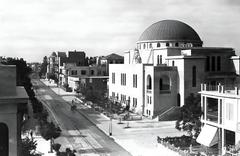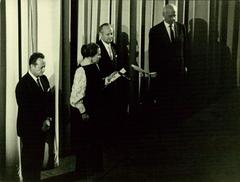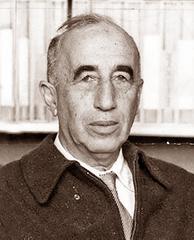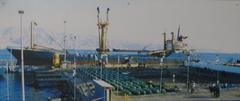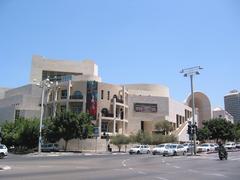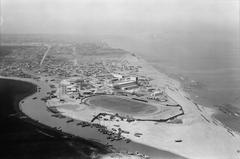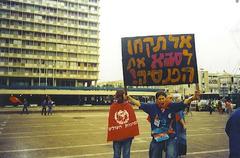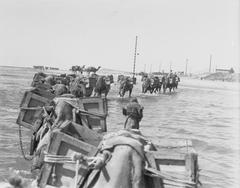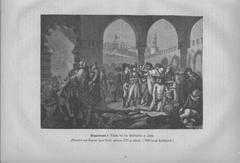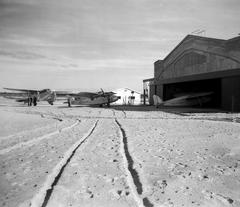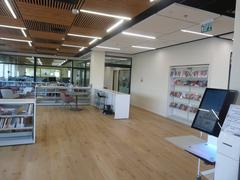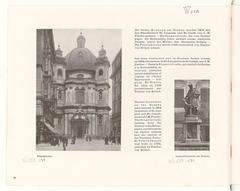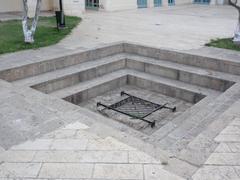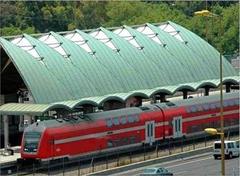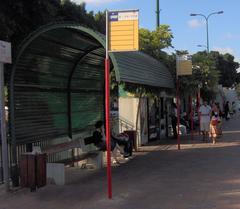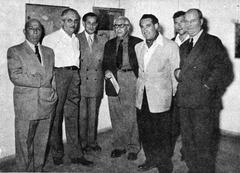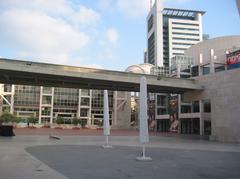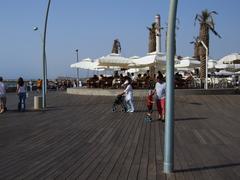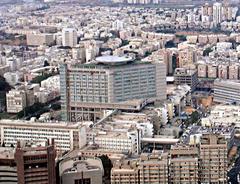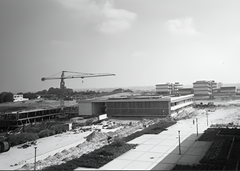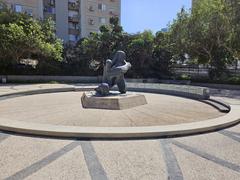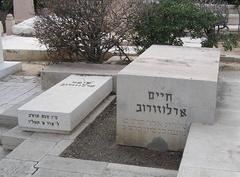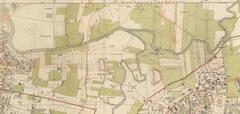Makhon Le-Heqer Tenuat Ha-Avodah Pinhas Lavon in Tel Aviv: Visiting Hours, Tickets, and Historical Significance
Date: 04/07/2025
Introduction
The Makhon Le-Ḥeḳer TenuʻAt Ha-ʻAvodah ʻA. Sh. Pinhas Lavon, commonly known as the Lavon Institute, is a vital institution at the heart of Tel Aviv. Dedicated to preserving and exploring the legacy of Israel’s labor movement, the Institute commemorates Pinhas Lavon—an influential leader whose contributions shaped Israel’s labor landscape and national development. The Lavon Institute offers visitors access to extensive archives, exhibitions, and educational resources that document over a century of labor history, from pioneering Zionist efforts and the kibbutz movement to the political intricacies of Mapai and the Histadrut.
This guide provides a comprehensive overview of the Lavon Institute’s historical significance, practical visitor information—including hours, admission, accessibility, and research services—and recommendations for making the most of your visit. Whether you are a scholar, student, or history enthusiast, the Lavon Institute stands as a gateway to understanding the enduring impact of labor solidarity and socialist ideals on Israeli society (Lavon Institute Official Website; EHRI Project; Stanford University).
Contents
- Early Life and Legacy of Pinhas Lavon
- The Israeli Labor Movement and Histadrut
- The Lavon Affair and Its Impact
- Visiting the Lavon Institute: Practical Guide
- Location and Access
- Visiting Hours
- Admission and Booking
- Accessibility and Visitor Services
- Guided Tours and Special Events
- Research Facilities and Archival Collections
- Visitor Guidelines and Tips
- Nearby Attractions
- Frequently Asked Questions (FAQ)
- Conclusion and Visitor Recommendations
- Sources and Further Reading
Early Life and Legacy of Pinhas Lavon
Pinhas Lavon (1904–1976), born Pinhas Lubianiker in Eastern Galicia, was a prominent Zionist activist and labor leader. After studying law at Lviv University and co-founding the Gordonia youth movement, Lavon immigrated to Palestine in 1929, where he played a major role in rebuilding Kibbutz Hulda and merging youth movements to form a unified labor front. His rise within the Mapai party and the Histadrut positioned him at the center of Israel’s socio-political development (Encyclopedia.com; Biographs.org).
Lavon’s tenure as Secretary General of the Histadrut and later as Minister of Defense under Prime Minister Moshe Sharett saw him implement major social initiatives, including housing projects and worker integration. Despite his achievements, his resignation following the 1954 “Lavon Affair”—a failed covert operation in Egypt—became a watershed moment in Israeli politics, reflecting both the complexities and internal tensions of the labor movement (Britannica; Jewish Virtual Library).
Lavon was also a prolific writer and theorist, contributing works on socialist-Zionist ideology and labor rights.
The Israeli Labor Movement and Histadrut
The labor movement, or Tnu’at HaAvodah, emerged as a powerful force in the early 20th century, driven by ideals of social justice and collective action brought by Jewish immigrants during the Second Aliyah (1904–1914). The foundation of the Histadrut in 1920 marked the beginning of a new era in Jewish labor organization, quickly becoming the largest and most influential institution within the Yishuv (pre-state Jewish community).
The Histadrut was more than a trade union; it operated businesses, health funds, and educational institutions, and played a decisive role in shaping Israel’s political and economic landscape. Through its close association with the Mapai party, it influenced policies on immigration, public ownership, and social welfare. By the mid-20th century, the Histadrut managed a vast network of enterprises and social services, embodying the ethos of labor solidarity and egalitarianism (Stanford University).
Internal debates and factionalism, especially during episodes like the Lavon Affair, reflected the challenges of balancing ideological purity with pragmatic governance. While the Histadrut’s influence waned following privatization and economic liberalization in the late 20th century, its legacy remains central to Israeli society.
The Lavon Affair and Its Impact
The “Lavon Affair” of 1954 was a pivotal episode in Israel’s political history. A failed covert operation in Egypt led to Lavon’s resignation as Minister of Defense, sparking political controversy and deep divisions within the Mapai party and the broader labor movement. Although later investigations cleared Lavon of direct responsibility, the scandal exposed internal rivalries and contributed to shifts in party leadership and public trust (Jewish Virtual Library).
The Lavon Institute preserves extensive archival materials related to this affair, offering invaluable insights for researchers and the public.
Visiting the Lavon Institute: Practical Guide
Location and Access
The Lavon Institute is centrally located in Tel Aviv, within the Amalalid network complex of the pedagogical-technological centre. The exact address is best obtained by contacting the Institute directly. The location is easily reachable by public transportation, and taxis or ride-sharing services are readily available (EHRI Portal).
Visiting Hours
- Standard Hours: Sunday to Thursday, 9:00 AM – 5:00 PM (some sources indicate closing at 4:00 PM on certain days)
- Closed: Fridays, Saturdays, and public holidays
Due to possible variations, visitors are strongly advised to check the official website or contact the Institute before planning a visit.
Admission and Booking
- General Admission: Free of charge
- Guided Tours & Events: May require advance booking and, in some cases, a nominal fee
- Advance Booking: Highly recommended, especially for research visits or use of archival materials. Contact details are available on the EHRI Portal and the Institute’s official site.
Accessibility and Visitor Services
- Physical Accessibility: The Institute offers ramps and elevators for wheelchair users and visitors with disabilities. Please notify the Institute in advance for specific needs.
- Languages: Staff primarily speak Hebrew and English, with some able to assist in Yiddish, Russian, or German.
Guided Tours and Special Events
- Guided Tours: Available in Hebrew and English by prior arrangement; tours cover the Institute’s history, archival highlights, and labor movement exhibitions.
- Events: The Institute hosts lectures, workshops, and book launches related to labor history and social policy. Event schedules are updated on the official website and social media.
Research Facilities and Archival Collections
Archival Holdings
The Lavon Institute houses one of Israel’s most comprehensive labor archives, including:
- Records from the Histadrut and affiliated unions
- Personal papers of major labor leaders, such as Pinhas Lavon and David Ben-Gurion
- Extensive photographs, audio-visual recordings, and memorabilia documenting labor activities and daily life
- Exclusive collections on women in the labor movement and kibbutz/moshav development
- Holocaust-era documents, correspondence, and oral testimonies in multiple languages (EHRI Project)
Research Access
- Reading Rooms: Quiet, equipped with microfilm and audio equipment. Staff assistance available.
- Digital Access: A significant portion of materials is digitized and searchable through the Institute’s online portal, with some resources accessible globally via the EHRI Project.
- Reproduction: Requests for photocopies, scans, or photographs must be submitted to staff; fees and permission may apply.
Visitor Guidelines and Tips
- Plan Ahead: Contact the Institute to arrange visits and request specific materials.
- Bring Photo ID: Required for entry and registration.
- Security: Standard procedures, including bag checks, are in place.
- Respectful Conduct: Eating, drinking, and pens are prohibited in reading rooms. Maintain a quiet atmosphere.
- Photography: Allowed only with permission and in designated areas.
- Wi-Fi and Lockers: Available upon request; large bags may not be permitted in reading areas.
Nearby Attractions
Make the most of your trip by visiting nearby Tel Aviv landmarks such as:
- Eretz Israel Museum
- Independence Hall Museum
- Tel Aviv Museum of Art
- Carmel Market
- Bauhaus Center
These sites provide additional context to Tel Aviv’s vibrant history and culture.
Frequently Asked Questions (FAQ)
Q: Is there an admission fee to visit the Lavon Institute?
A: No, admission is free, but advance booking is recommended for research access and guided tours.
Q: What are the opening hours?
A: The Institute is open Sunday to Thursday, typically 9:00 AM–5:00 PM. Closed Fridays, Saturdays, and public holidays.
Q: Are guided tours available in English?
A: Yes, but they require advance booking.
Q: How do I book a visit or request materials?
A: Contact the Institute via phone or email, as listed on the EHRI Portal or official website.
Q: Is the Institute accessible for visitors with disabilities?
A: Yes, with ramps, elevators, and staff assistance available upon request.
Q: Can I take photographs inside the Institute?
A: Only in designated areas and with prior permission.
Q: Does the Institute offer virtual tours or digital access to archives?
A: Yes, a growing number of digitized materials are accessible online, and virtual tours are offered via the website.
Conclusion and Visitor Recommendations
The Lavon Institute stands as a cornerstone for anyone seeking to understand the historical roots and ongoing influence of Israel’s labor movement. Its extensive archives, educational programs, and public exhibitions provide a unique perspective on the development of Israeli society, from early kibbutz pioneers to the political complexities of the modern state.
With free admission, accessibility features, and multilingual staff, the Institute is a welcoming destination for both casual visitors and dedicated researchers. To ensure a productive visit, plan ahead by consulting the Institute’s official channels, booking in advance, and exploring digital resources. Enhance your experience by integrating your visit with other key historical and cultural sites in Tel Aviv.
For the latest updates on visiting hours, exhibitions, and special events, follow the Lavon Institute’s official website and social media channels. Consider using the Audiala app for guided tours and archival research tools.
Visual Media
Alt text: “Lavon Institute entrance in Tel Aviv, a key historical research site”; “Archival documents and photographs at the Lavon Institute for Labour Research”.
Sources and Further Reading
- Lavon Institute Official Website
- EHRI Project
- EHRI Portal
- Stanford University
- Encyclopedia.com
- Biographs.org
- Britannica
- Jewish Virtual Library
